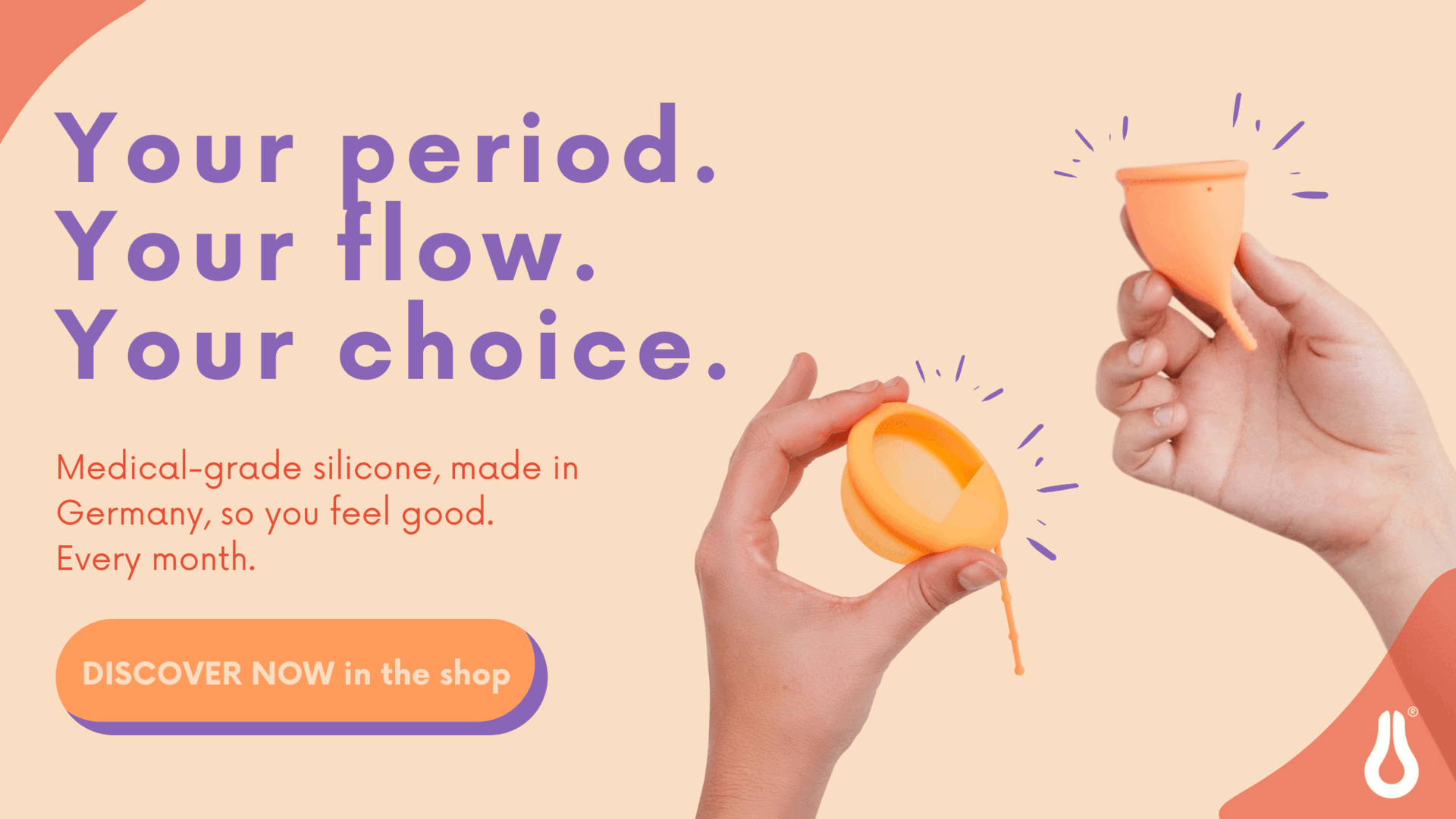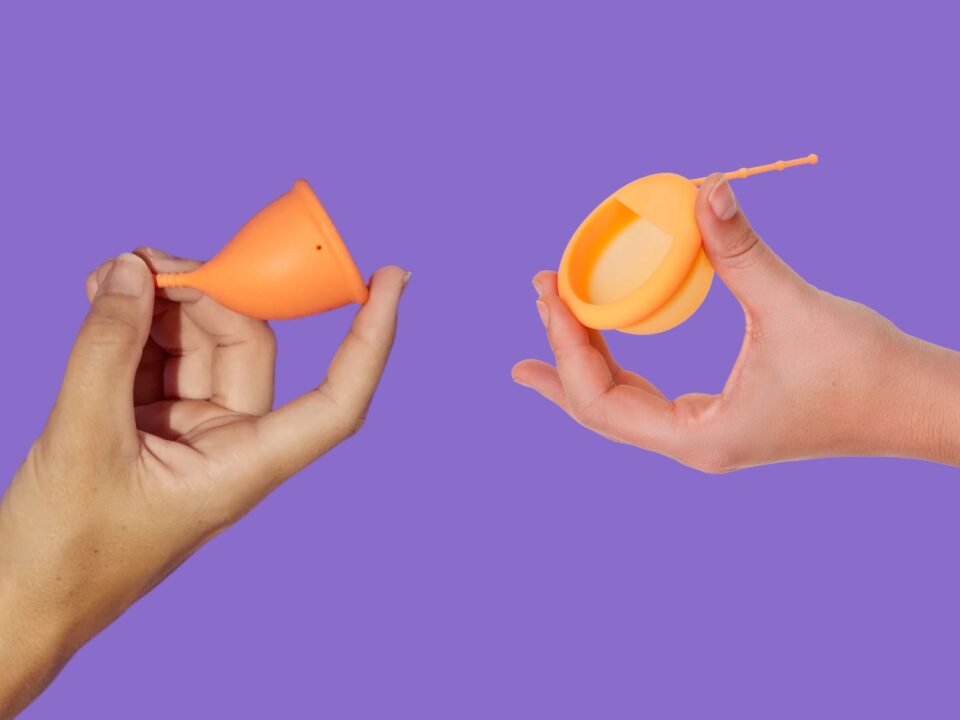
Understanding Menstruation: 7 Facts That May Surprise You
8 de November de 2025
Iron Deficiency from Period: Symptoms and Causes
24 de November de 2025
Intimate Care for Women – explained gently, naturally & honestly:
What does your vulva really need? In this guide we show you how to care for your intimate zone healthily, with natural tips, completely without shame. Plus: 7 typical mistakes you're better off avoiding.
Intimate care is a topic that unsettles many women, yet it means far more than just daily washing. A healthy vulva (external intimate area) and vagina (internal intimate area) need above all gentle care, understanding of your own body, and a bit of self-care. In this post you'll learn honestly and empathetically why intimate hygiene is important, which common mistakes you should avoid, and which intimate care tips really help. All in PapayaCup style: gentle, body-positive, empowering, and without unnecessary technical jargon. Let's go, for your good feeling and a healthy vulva!
Why Intimate Care is More Than Washing
Many think of thorough washing first when it comes to intimate care. Sure, cleanliness in the intimate area is important, but intimate care encompasses so much more. Your vagina is actually a little self-cleaning wonder: Inside, lactic acid bacteria keep the vaginal environment slightly acidic (with a pH value of about 3.8 to 4.5). This acidic environment protects you from pathogens and infections.
If this balance is disturbed, for example by too much soap, intimate douches, or perfumed products, it can lead to irritations, dryness, or odor.
That's why gentle care is so important. A stable vaginal environment protects you from infections, explained in more detail for example here on Wikipedia. But what does this mean concretely for your everyday life? Which products are really useful and what should you avoid?
Comparison: Conventional Intimate Care Products vs. Natural Intimate Care
Criterion | Conventional Products (e.g., intimate deodorants, perfumed soaps) | Natural Intimate Care (e.g., lukewarm water, pH-neutral lotion) |
pH-friendly | ❌ Mostly alkaline or perfumed | ✅ pH-neutral, respects your vaginal flora |
Fragrances / Perfume | ✅ Often contained, can irritate | ❌ No fragrances – odorless and skin-friendly |
Protection of mucosa | ❌ Can dry out or irritate | ✅ Maintains the skin's natural moisture film |
Risk of imbalance | ❌ Increased – promotes infections like vaginosis | ✅ Low – supports the healthy vaginal environment |
Sustainability | ❌ Often single-use plastic, microplastic, chemicals | ✅ Environmentally friendly, minimal packaging, reusable |
Long-term costs | ❌ Higher due to constant repurchasing | ✅ More affordable with long-term solutions like cup or disc |
This overview shows: less is more and gentle is stronger. Instead of investing in perfume and pink packaging, it's worth looking at what your body really needs: mindfulness, naturalness, and care that doesn't disturb it, but supports it.
If you opt for pH-neutral products or switch directly to water and reusable solutions like PapayaCup or PapayaDisc, you're not only doing yourself a favor but also the environment.
7 Mistakes in Intimate Care
Nobody is perfect and almost every one of us has made well-intentioned intimate care mistakes. We show you 7 typical misconceptions that can harm your vulva health, and how to avoid them:
- Too aggressive cleaning or intimate douches: Your vagina cleans itself from the inside. Aggressive soaps, frequent rinsing, or intimate douches disrupt the pH balance. The result can be irritations, dry mucous membranes, or infections.
Better: Wash only the vulva (external areas) gently with lukewarm water. If you use a cleaning product, make it a pH-neutral, unscented intimate wash gel and really only externally. - Using perfumed products & intimate deodorants: An unpleasant vaginal odor unsettles many women, but deodorant in the intimate area is not a good idea. Perfumed shower gels, intimate sprays, or wet wipes only mask odor temporarily and destroy the protective vaginal flora long-term. The sensitive skin can react with allergic reactions or burning.
Better: Avoid fragrances "down there." Your vulva doesn't have to smell like flowers – a natural, slight intimate odor is normal! In case of strong odor, rather investigate the cause (e.g., infection) instead of fighting it with perfume. - Wrong or too tight underwear: Lace thongs look beautiful but can cause chafing. Synthetic fabrics trap heat and moisture. Both create an environment where fungi and bacteria feel comfortable. Better: In everyday life, use cotton underwear that is breathable.
Also important: Change underwear daily (with discharge or sweating, even more often) and wash at at least 60°C to kill germs. Rinse well after washing, detergent residues can irritate. - Wearing tampons too long or wrong period products: Even during your period your intimate zone needs air and a stable environment. A common mistake is leaving tampons too long in the body, which promotes not only an unpleasant odor in the intimate area but in the worst case toxic shock syndrome. Moreover, tampons on light days can dry out the vagina.
Better: Change tampon at least every 4-8 hours or on light days switch to pads or a menstrual cup.
Did you know that tampons when swimming absorb not only blood but also chlorinated pool water or seawater? This can disturb the vaginal flora. A great alternative are reusable menstrual products made of medical silicone that don't absorb: for example our PapayaCup (menstrual cup) or PapayaDisc (menstrual disc). Both can be worn for up to 12 hours, they don't cause dryness and protect the vaginal balance.
(Usage tips can be found in the PapayaCup manual and in the manual for the menstrual disc.) And whether tampon, cup, or pad: Change regularly and always wash your hands thoroughly before changing or inserting anything in the intimate area, this prevents infections. - Shaving dry or unsanitary: Intimate shaving is a matter of preference, some like it natural, others smooth. But if you shave, an intimate care pitfall lurks here: dull blades, hasty dry shaving, or a borrowed razor from your partner. All this can lead to micro-injuries, razor burn, and pimples. Through small cuts, bacteria can enter more easily.
Better: Take your time for intimate shaving. Use a sharp, clean multi-blade razor or a special women's razor for the bikini area. Always shave with shaving foam/gel on wet skin (never dry!) and in the direction of hair growth to minimize skin irritation. Rinse the blade thoroughly, disinfect it after use, and change it regularly. And very important: Your razor belongs to you alone, don't share it, if only for hygiene reasons. - Cuddling with moisture: Germs love warmth and moisture. A common mistake is not drying properly "down there" after showering or swimming. Also staying for hours in a wet bikini or sweaty sport leggings pleases fungi & co.
Better: Pat your intimate area dry after washing with a clean, soft towel (don't rub!). Change wet swimwear immediately and get out of steamy workout clothes quickly after exercise. Your vulva needs fresh air, treat it sometimes to sleeping "commando" at night so everything stays dry and can breathe. - Ignoring warning signs & not going to the doctor: Many women postpone embarrassing questions or complaints. But your vulva speaks to you, pay attention to changes! Persistent itching, foul-smelling discharge, pain or unusual redness are warning signs. The biggest mistake would be to simply endure that or self-medicate with questionable home remedies. Of course, there are gentle home remedies for unpleasant odor or slight imbalance (e.g., natural yogurt or vinegar sitz baths), but they don't replace a medical diagnosis.
Better: Don't be shy to visit your gynecologist in case of problems. Detected early, vaginal infections like a yeast infection or bacterial vaginosis are easily treatable. Intimate care also means taking care of your own health and seeking help when something is wrong.

5 Important Intimate Care Tips for Women
Now that we know what we better avoid, here are five positive tips for daily intimate care that will make your vulva happy:
- Less is more – clean gently: Wash your vulva once daily with lukewarm water. Normally you don't need to do more. If you feel cleaner, you can use a mild, unscented intimate wash lotion, but not more than 1x per day and only externally on the labia. Avoid washcloths or sponges, as bacteria can collect in them. Your clean hands are completely sufficient. And please no soap with strongly alkaline pH, that would destroy the acid protective mantle. Keep it simple and gentle.
- Breathable clothing & care "around": Remember, intimate care doesn't end under the shower. Wear underwear made of cotton or other natural fibers in everyday life, and change wet clothing quickly. After using the toilet, wipe from front to back to avoid carrying intestinal bacteria forward.
If you are very sensitive, you can slightly moisten toilet paper with water instead of using wet wipes, this way you clean gently, without chemicals. These small habits keep the intimate area in balance. - Healthy habits & nutrition: What is good for you overall often also benefits your vagina. Pay attention to a balanced diet and sufficient water, that supports your immune system and mucous membranes. Too much sugar, for example, can promote recurrent yeast infections. Eating probiotic yogurt, for example, provides good bacteria.
And don't forget to breathe: Stress weakens the defenses, also in the intimate area. So treat yourself to breaks and sleep sufficiently. Selfcare is not a luxury, but prevention, a cup of herbal tea, a walk, conscious relaxation help your whole body, including your vulva health. - Using the right menstrual products: During your period you should be especially mindful. Change pads and tampons regularly, use unscented organic panty liners if you have sensitive skin. If you notice that tampons give you a feeling of dryness or frequent infections occur, try alternative products. Menstrual cups like the PapayaCup or flat menstrual discs like the PapayaDisc are intimate care products without chemicals: They do without absorbing substances and respect the natural vaginal environment. Moreover, they are sustainable and comfortable, you can even swim or (with the disc) have intercourse with them, without leaking.
Important: Follow the hygiene rules during use (boil, clean thoroughly, see our manual and size guide for the PapayaCup). This way everything stays clean and safe. - Natural care for minor complaints: Little helpers from nature can work wonders, but always with caution! For light irritation, for example, a chamomile sitz bath helps to calm the skin. Coconut oil (organic, cold-pressed) is suitable in mini amounts for moisturizing in case of external dryness or after shaving as natural, antibacterial care. Also drinking cranberry juice can help prevent urinary tract infections. And when your hormones go crazy (PMS sends greetings!), try a relaxing ritual: for example a cup of our Hormonal Balance Herbal Tea. This specially balanced herbal mixture supports hormonal balance and relieves PMS symptoms, so you do yourself good internally, which can also positively affect the intimate area.
Overall: Natural intimate care means using gentle home remedies and lots of mindfulness, without overstimulating the sensitive area.
Natural Intimate Care & Selfcare
Intimate care is selfcare. 💕 We can tell ourselves this sentence more often. Your female intimate zone is a fascinating, powerful part of your body. Caring for it naturally means above all respecting it and learning to love it. Take your time for a small selfcare ritual: For example a warm bath with a few drops of tea tree oil (acts antibacterial) or Dead Sea salt (calms the skin), afterwards slip into fresh cotton underwear, get comfortable and drink a pot of soothing herbal tea. Such moments of relaxation lower the stress level and stress, as we know, can also affect the vaginal flora.
Natural intimate care also means knowing your body. Look at your vulva calmly in the mirror, learn how everything looks when it's healthy. This way you'll notice faster if something is unusual, and it also helps to reduce any shame. The more you know your body, the more confidently you can stand up for it, whether at the doctor's appointment or by unabashedly asking for pH-neutral wash lotion in the drugstore. It is your body, your health.
And last but not least: Don't be afraid to ask questions or talk with friends about intimate hygiene. Precisely because intimate care is so natural, it shouldn't remain a taboo topic. The open exchange, whether about the best menstrual cup or a new favorite care product, strengthens all of us to accept our body. Natural intimate care & selfcare also means taking the topic out of the taboo zone and giving it a positive connotation. Your vulva deserves loving attention, and you'll see: If you take good care of it, it will thank you with an all-around good feeling!
Conclusion: You Can Be Gentle With Yourself
Intimate care begins with knowledge and ends with trust. Trust in your body, your feeling, and your rhythm. If you care for your vulva lovingly, without too much, but with mindfulness, you do yourself good every day. Intimate hygiene doesn't mean adapting, but feeling good.
Whether with water, cotton, menstrual cup, or herbal tea: You decide what feels good to you. And if something doesn't work, stay gentle with yourself. Your body deserves love, not judgment.
FAQ About the Intimate Area
Correct intimate care begins with gentle handling. Wash your intimate area daily with lukewarm water and without soap. Use only pH-neutral, unscented products if necessary. Cotton underwear ensures breathability and protects against irritation. Important note: Your vulva doesn't have to smell like flowers. A slight odor is completely normal. Avoid perfumed products as they can disturb the sensitive balance.
The pH value in the intimate area is crucial for the health of your vulva. A pH value of 3.8–4.5 protects against harmful germs and promotes the growth of good lactic acid bacteria. Too high pH values, as caused by soaps or aggressive care products, can disturb the environment and promote infections. Protect your pH by using pH-neutral, gentle care products and avoiding too frequent cleanings. Your body knows how to protect itself!
Dryness in the intimate area is uncomfortable but not a rare problem. Frequent causes are hormonal changes, wrong intimate care, or wearing synthetic underwear. To avoid dryness, use pH-neutral products without alcohol and perfume. Treat your intimate area to moisture with special intimate creams or aloe vera. Make sure to wear breathable cotton underwear and avoid tight clothing to prevent skin irritations.
Yes! Especially the menstrual disc is known for allowing penetrative sex during the period. It sits at the base of the cervix and doesn't cause a vacuum, so you can wear it comfortably without it interfering with intercourse. However, make sure that the retrieval ring of the PapayaDisc is shortened if necessary. Naturally, hygiene and regular change are crucial to maintain the feeling of well-being. Your menstrual cup should be changed every 12 hours.
After sports it's especially important to care for the intimate area correctly to avoid skin irritations and infections. Change your sweaty clothes as quickly as possible and put on breathable cotton underwear. Showering is ideal, but avoid aggressive shower gels or perfumed products. Gently drying with a soft towel is often enough. For additional well-being, you can take a sitz bath with chamomile or apple cider vinegar to calm and care for your vulva.




